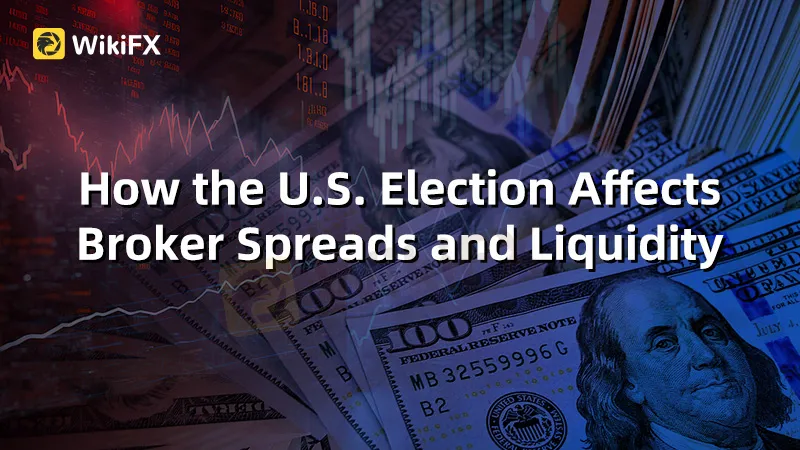简体中文
繁體中文
English
Pусский
日本語
ภาษาไทย
Tiếng Việt
Bahasa Indonesia
Español
हिन्दी
Filippiiniläinen
Français
Deutsch
Português
Türkçe
한국어
العربية
How the U.S. Election Affects Broker Spreads and Liquidity
Abstract:The U.S. presidential election is a significant event that can impact financial markets in various ways. For traders, understanding how election outcomes influence broker spreads and liquidity is crucial for strategic decision-making. This article explores the mechanisms behind these changes and offers insights for navigating the trading landscape during election periods.

The U.S. presidential election is a significant event that can impact financial markets in various ways. For traders, understanding how election outcomes influence broker spreads and liquidity is crucial for strategic decision-making. This article explores the mechanisms behind these changes and offers insights for navigating the trading landscape during election periods.
Political events often introduce a layer of uncertainty in financial markets. During election cycles, especially in a highly polarized environment, traders may react by adjusting their positions based on anticipated outcomes. This volatility can lead to wider spreads, as brokers increase their pricing margins to account for the heightened risk associated with fluctuating market conditions.
For instance, as election day approaches, market participants often speculate on which candidate will win and how their policies might affect various sectors of the economy. This speculation can result in increased trading volumes, driving demand for liquidity. However, the increased risk can also deter traders from entering positions, causing liquidity to dry up in certain market segments.
Broker spreads—the difference between the bid and ask price—are a reflection of market sentiment and liquidity. During an election, brokers might widen their spreads to mitigate the risk of price swings that can occur in response to election results or related news. For example, if a candidate favoured by the market appears to be losing ground in the polls, brokers may react by adjusting their spreads to account for potential price declines.
Moreover, different asset classes may respond differently to election outcomes. Equities, forex, and commodities each have unique sensitivities to political developments. Traders focusing on foreign exchange may see spreads widen particularly during significant news announcements, such as election results or major policy speeches, reflecting the uncertainty surrounding currency valuations.
Liquidity, or the ease with which assets can be bought or sold without affecting their price, is often challenged during the lead-up to the U.S. election. As traders await the outcome, many may adopt a wait-and-see approach, leading to lower trading volumes. This diminished activity can exacerbate the widening of spreads, as brokers may struggle to match buyers and sellers efficiently.
Additionally, the type of election—presidential, midterm, or local—can influence liquidity dynamics. Presidential elections tend to draw more attention and trading activity due to their broader implications for national policies. In contrast, midterm elections might see less market impact, though volatility can still arise if significant changes in Congress are anticipated.
Once the election results are announced, markets often experience a period of adjustment. Depending on the outcome, traders may quickly reassess their strategies, leading to rapid buying or selling. This post-election volatility can cause spreads to narrow again as liquidity returns and brokers adapt to the new market conditions.
However, if the election outcome is contested or leads to prolonged uncertainty—such as legal challenges or recounts—brokers may maintain wider spreads for an extended period. This cautious approach helps them manage the risks associated with unpredictable price movements.
In summary, the U.S. election significantly influences broker spreads and liquidity, with both pre-election speculation and post-election reactions shaping market dynamics. Traders should remain vigilant during these periods, understanding that the heightened volatility can present both challenges and opportunities. By staying informed about political developments and their potential impacts on financial markets, traders can better navigate the complexities of trading during election seasons.

Disclaimer:
The views in this article only represent the author's personal views, and do not constitute investment advice on this platform. This platform does not guarantee the accuracy, completeness and timeliness of the information in the article, and will not be liable for any loss caused by the use of or reliance on the information in the article.
Read more

Thinking of Investing? Read Must-Know Facts About Funding pips!
When you check the internet for Funding Pips, you'd be surprised to know it's filled with praise for Funding Pips but often lacks the real facts that traders need. Everything that seems too good to be true should always be verified first. It could be Fraud . So, we conducted research and collected several facts you must know about Funding Pips.

OctaFX Back in News: ED Attaches Assets Worth INR 134 Cr in Forex Scam Case
The Enforcement Directorate (ED) in Mumbai has attached assets worth around INR 131.45 crore. This included a luxury yacht and residential properties in Spain. Read this interesting story.

Truth About Angel One – Here’s What You Need to Know
Thinking about investing in Angel One? Wait! Know the essential things about the broker before Invest. It could be SCAM. Read, think, and invest .

OANDA Rebrands TMS Brokers in Lithuania and Latvia Forex Markets
OANDA upgrades Baltic forex with TMS Brokers rebranding and new mobile app for enhanced trading technologies in Europe.
WikiFX Broker
Latest News
He Thought He Earned RM4 Million, But It Was All a Scam
CryptoCurrency Regulations in India 2025 – Key Things You Should Know
OctaFX Back in News: ED Attaches Assets Worth INR 134 Cr in Forex Scam Case
Trump inaugural impersonators scammed donors out of crypto, feds say
Ethereum is powering Wall Street's future. The crypto scene at Cannes shows how far it's come
Forex Hedging: Is It a Trader’s Safety Net or Just an Illusion?
US debt is now $37trn – should we be worried?
OPEC+ members agree larger-than-expected oil production hike in August
Top Wall Street analysts are pounding the table on these 3 stocks
US Jobs Data Out: Boom in Government Sector, Not So in Private Sector
Currency Calculator


